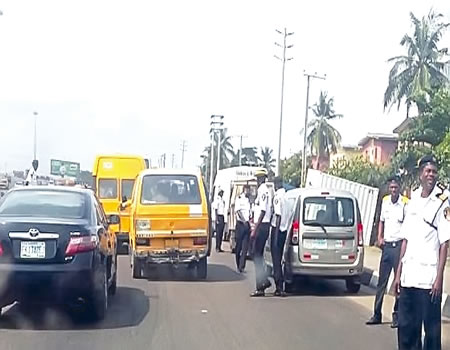A few weeks ago, Lagos State governor, Mr Akinwunmi Ambode, asked Vehicle lnspection Officials and Federal Road Safety Corps operatives to vacate major highways in the state. Though the directive by the governor received loud applause from residents, particularly motorists, who have had cause to complain about the activities of officials of the two agencies, OLALEKAN OLABULO writes that the affected agencies are not happy over the development.
IT all started with a directive from the Lagos State governor, Akinwunrni Ambode, to operatives of the Vehicle Inspection Service (VIS), popularly known as vehicle inspection officers (VIOs) in Lagos to vacate all roads in the state. The directive sounded unusual, prompting many road users to wave it off as a temporary order. Some also claimed that the vacation order was meant for VIOs to undergo more training and reorientation.
Governor Ambode, while speaking sometimes later, made it clear to doubters that his government meant business by reiterating that the order was permanent.
He also gave a directive that activities of officials of the Federal Road Safety Corps (FRSC) be restricted to major highways, a directive that is already causing jubilation among motorists in the state but which the road safety agency said was a piece of advice rather than an order.
Sunday Tribune’s investigation has, however, revealed that though the operatives of the VIS have complied with the directive from the governor, getting them to vacate the roads, according to some of them, is “not the best thing for Lagos.” But for the general public, which has been at the receiving end of the activities of the VIOs, the governor has acted in the best interest of the people, his directive is in order.
As expected, the order has continued to generate reactions from people across the state. While a majority of respondents, mostly private and commercial vehicle operators commended the governor for the act, some operatives of the FRSC, VIS and other security operatives disagreed, while calling for caution.
Motorists and commuters in the state applauded the governor for what they described as a right step in the right direction to curb the excesses of the officers.
Some of them claimed that both the VIOs and FRSC officers carry out the same duties, alleging that these officials mostly extort money from motorists rather than ensure safety on the roads.
A driver who simply identified himself as Akin, while speaking with the Sunday Tribune said: “I am very happy with what the governor has done. There has always been a strong need to critically look into the operations of these two agencies. There is also a need to review their operations.”
He reeled off a litany of allegations against officials of the two agencies, particularly their high extortive capacities.
“Though they have one or two things that they do on the road, their excesses out-weigh their significance. At every point, you have them extorting money from motorists and those who refused to cooperate with them would have their vehicles towed to their office where they would be made to pay for offences.
“The last administration in the state empowered them the more. They were turned into money generating agencies. That adversely affected their operations. All they are interested in is money. There is no way you get to their office and you are not fined for at least two offences.”
A female motorist, who identified herself simply as Evelyn, also commended the governor for taking that step. According to her, she had on several occasions abandoned her vehicle for public buses as a result of her fear for VIOs and FRSC officials.
“Government’s directive on the out-right ban of VIO officials from Lagos roads is not only laudable, it is also a right step in the right direction towards checkmating their excesses and overbearing disregard for motorists,” she said.
Elejire, a commercial bus driver, was highly elated when Sunday Tribune asked for his views on the ban. For him, getting these two agencies off highways “is freedom from oppression. The ban on these people (VIO and road safety officials) is for (the sake of) commercial bus operators,” he said.
“Most of us bear the brunt of their illegalities. There is no way you can fall into their hands and go scot-free. They must always find one offence or the other for you, if you refused to bribe them. On a bad day, you can bribe many groups of VIOs and road safety officials, because they know people are always afraid of having their vehicles towed to their offices.”
Elejire said further that he would like to see the ban extended to the operatives of the Lagos State Traffic Management Authority (LASTMA), who, according to Boboye, FRSC DG, are not different from the VIOs in terms of extortion. “They are birds of a feather,” he said.
We will enlighten our members on road safety regulations
A top official of the National Union of Road Transport Workers (NURTW), who pleaded anonymity, while speaking with the Sunday Tribune said “the governor has really done very well. He has done thousands of our members a great favour, because our drivers go through hell everyday at the hands of these two agencies.”
The NURTW chief added that “what we need to do now is to ensure that our members comply with road safety rules and regulations without being prompted by any government agency. We will enlighten them from time to time on the need to behave and not invite the VIOs and FRSC officials back with their negligence and non-compliance with road safety guidelines.”
Sunday Tribune made attempts to speak with some top officials of the VIS in the state, but some of them refused outright.
But one of them who chose to speak said he would only do so incognito. The official, who did not hide his displeasure with the directive, said Lagos State government would need to reconsider the ban.
“There is a need for the governor to reconsider the ban on our operations. There are many areas where our operations are needed for safety on the road. We help in ensuring compliance with road safety rules and regulations. Some people renew their papers just because of VIOs.
“In the interest of the state and the people, the government should review the activities of our men and not completely ban us. Government should not throw out the baby with the bath water. You cannot say because vehicles cause accidents and you ban vehicles completely,” he said.
The Lagos State Sector Commander of the FRSC, Hyginus Omeje, however, described the media report of the governor’s statement as misinterpreted, adding that the governor only advised the FRSC on their operations on the inner city roads.
Omeje also told the Sunday Tribune that the advice from the governor is only in tandem with the directive by the FRSC corps marshal that states that had established traffic management outfits should allow their traffic agencies to operate on city inner roads.
“I would not call it a restriction order. I will like to use the word that the governor used. He only advised. If you listened to the tape very well, the governor advised the FRSC to keep to the highways rather than within the streets of Lagos.
“If you look at the FRSC Act, an act of the National Assembly, it empowers it to operate on all public roads. That same act also as part of the listed responsibilities of FRSC should encourage the states to set up their own traffic management agencies. It is natural that having midwife a state traffic agency, that is LASTMA, you just need to leave the streets and city roads to the state agency and concentrate on the highways but that does not mean that we will close our eyes to illegalities on a road like the Ikorodu road,” Omeje said.
Regardless of the political correctness of the directive, which, however, is not lost on residents and motorists in Lagos, what Ambode has done is to take a chunk of the problems they encounter on the roads away from them. At least for some time to come, they will not have to be confronted by the VIOs on the major roads.






